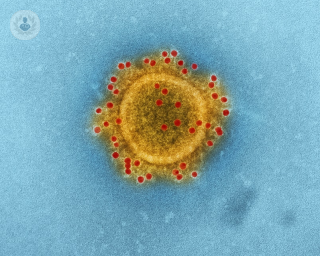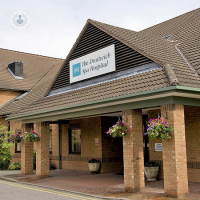What is lymphoma?
Lymphoma is a group of blood cancers developing from lymphocytes, which are the cells that defend the body in the immune system. This proliferation takes place in the nodules or lymph nodes, although sometimes it also affects the spleen or liver. Thus, it is a cancer that originates in the lymphatic tissue.
As a result of the disease, there is an impairment of the immune system, which accentuates as the disease further spreads. If the bone marrow has been affected, it can lead to anaemia or other changes in the blood cells.
Lymphoma accounts for about 3 to 4 per cent of all cancers around the world.
What are the different types of lymphoma?
There are two main types of lymphoma:
- Hodgkin's lymphoma or Hodgkin's disease
- Non-Hodgkin's lymphoma
However, there is a new classification called the REAL System (Revised European American Lymphoma Classification), which divides types of lymphoma according to their clinical behaviour into three categories:
- Indolent lymphoma: This grows slowly. Patients with this type of lymphoma can live for many years without any treatment and without presenting the problems derived from the disease. In fact, in many of these patients treatment is discouraged if they do not develop symptoms.
- Aggressive or highly-aggressive lymphoma: This type of lymphoma grows faster than the previously mentioned types. It's essential to treat patients otherwise life expectancy is reduced to weeks or months. Luckily this lymphoma responds well to chemotherapy and many of them are curable.
What are the symptoms?
Normal lymphoma manifests through protruding lymph nodes, which increase in size and are visible in areas such as the neck, armpits or groins. However, when they appear in less accessible areas such as the abdomen or the mediastinum (the space in your chest which holds your heart and other important structures) they can go unnoticed, thus making it difficult to diagnose until symptoms do not usually appear. These symptoms include, among others:
- Fever greater than 38 degrees
- Profuse sweating at night
- Unexplained weight loss (more than 10 per cent in six months)
- Enlargement of the spleen
What causes lymphoma?
Presently, the exact causes that trigger lymphoma are unknown except in some cases that are related to infections caused by bacteria such as helicobacter pylori and borrelia or the Epstein-Barr virus (EBV).
Can it be prevented?
There's no way to prevent lymphoma. However, experts recommend leading a healthy lifestyle, which could reduce the risk of its appearance, but there is no direct relationship. Other recommendations are to avoid obesity, smoking and cardiovascular risk factors, not because they can cause lymphoma, but because a person with comorbidities (a primary disease or condition that co-occurs with, but is often independent of, another disease) is less likely to overcome favourably aggressive treatment, such as chemotherapy.
How is lymphoma treated?
The treatment of lymphoma depends on the prognosis, the age of the patient and his general state of health. A good preliminary study should be done to know the extent of the disease and subsequently decide the best treatment.
The most used treatments are:
- Alkylating agents, which directly attack DNA to prevent the reproduction of cancer cells;
- Rituximab is a type of monoclonal antibody indicated for non-Hodgkin lymphoma or relapses;
- Chemotherapy;
- Haematopoietic stem cell transplantation.
Lymphoma
Dr Michael Potter - Haematology
Created on: 03-12-2013
Updated on: 10-18-2023
Edited by: Karolyn Judge
What is lymphoma?
Lymphoma is a group of blood cancers developing from lymphocytes, which are the cells that defend the body in the immune system. This proliferation takes place in the nodules or lymph nodes, although sometimes it also affects the spleen or liver. Thus, it is a cancer that originates in the lymphatic tissue.
As a result of the disease, there is an impairment of the immune system, which accentuates as the disease further spreads. If the bone marrow has been affected, it can lead to anaemia or other changes in the blood cells.
Lymphoma accounts for about 3 to 4 per cent of all cancers around the world.
What are the different types of lymphoma?
There are two main types of lymphoma:
- Hodgkin's lymphoma or Hodgkin's disease
- Non-Hodgkin's lymphoma
However, there is a new classification called the REAL System (Revised European American Lymphoma Classification), which divides types of lymphoma according to their clinical behaviour into three categories:
- Indolent lymphoma: This grows slowly. Patients with this type of lymphoma can live for many years without any treatment and without presenting the problems derived from the disease. In fact, in many of these patients treatment is discouraged if they do not develop symptoms.
- Aggressive or highly-aggressive lymphoma: This type of lymphoma grows faster than the previously mentioned types. It's essential to treat patients otherwise life expectancy is reduced to weeks or months. Luckily this lymphoma responds well to chemotherapy and many of them are curable.
What are the symptoms?
Normal lymphoma manifests through protruding lymph nodes, which increase in size and are visible in areas such as the neck, armpits or groins. However, when they appear in less accessible areas such as the abdomen or the mediastinum (the space in your chest which holds your heart and other important structures) they can go unnoticed, thus making it difficult to diagnose until symptoms do not usually appear. These symptoms include, among others:
- Fever greater than 38 degrees
- Profuse sweating at night
- Unexplained weight loss (more than 10 per cent in six months)
- Enlargement of the spleen
What causes lymphoma?
Presently, the exact causes that trigger lymphoma are unknown except in some cases that are related to infections caused by bacteria such as helicobacter pylori and borrelia or the Epstein-Barr virus (EBV).
Can it be prevented?
There's no way to prevent lymphoma. However, experts recommend leading a healthy lifestyle, which could reduce the risk of its appearance, but there is no direct relationship. Other recommendations are to avoid obesity, smoking and cardiovascular risk factors, not because they can cause lymphoma, but because a person with comorbidities (a primary disease or condition that co-occurs with, but is often independent of, another disease) is less likely to overcome favourably aggressive treatment, such as chemotherapy.
How is lymphoma treated?
The treatment of lymphoma depends on the prognosis, the age of the patient and his general state of health. A good preliminary study should be done to know the extent of the disease and subsequently decide the best treatment.
The most used treatments are:
- Alkylating agents, which directly attack DNA to prevent the reproduction of cancer cells;
- Rituximab is a type of monoclonal antibody indicated for non-Hodgkin lymphoma or relapses;
- Chemotherapy;
- Haematopoietic stem cell transplantation.


Diffuse large B-cell lymphoma: explained
By Professor Graham Collins
2024-12-25
Diffuse large B-cell lymphoma (DLBCL) is a relatively uncommon cancer which affects more males than females. Leading consultant haematologist Dr Graham Collins discusses the cancer, including its prognosis and treatment options. See more


An expert guide to non-Hodgkin's lymphoma
By Dr David Wrench
2024-12-25
Learning more about lymphomas, especially the different types and how they affect you, in order to gain an understanding of the condition can provide a sense of control and positivity after a diagnosis. Here to highlight the difference between non-Hodgkin's lymphoma and Hodgkin's lymphoma is leading consultant haematologist Dr David Wrench. See more


Immunodeficiency: an in-depth explanation
By Dr Ricardo Jose
2024-12-23
Immunodeficiency occurs when the immune system suffers impairment and, as a result, cannot function properly. In our latest article, we spoke with esteemed pulmonologist, Dr Ricardo Jose, to learn more about this immune-system-threatening condition. See more


What is Hodgkin lymphoma?
By Professor Graham Collins
2024-12-20
Hodgkin lymphoma is a type of cancer that affects an estimated 2,000 people in the UK each year. Here, Dr Graham Collins, renowned consultant haematologist based in Oxford, provides an expert insight into Hodgkin lymphoma, including its symptoms, risk factors and treatment. See more
Experts in Lymphoma
-
Dr Michael Potter
HaematologyExpert in:
- Leukaemia
- Lymphoma
- Multiple myeloma
- Myeloproliferative disorders
- Hodgkin's lymphoma
- Anaemia
-
Dr Salim Shafeek
HaematologyExpert in:
- Leukaemia
- Lymphoma
- Multiple myeloma
- Myeloproliferative disorders
- Anaemia
- Thrombosis
-
Dr Varun Mehra
HaematologyExpert in:
- Myelodysplastic syndrome
- Leukaemia
- Bone marrow transplant
- Lymphoma
- Myeloproliferative disorders
- Low blood count
-
Dr Richard Kaczmarski
HaematologyExpert in:
- Multiple myeloma
- Leukaemia
- Lymphoma
- Stem cells
- Anaemia
- Thalassaemia
-
Professor John Gribben
HaematologyExpert in:
- Leukaemia
- Lymphoma
- Stem cells
- Multiple myeloma
- Sickle cell anaemia
- See all

108 Harley Street Medical
108 Harley Street Medical
108 Harley Street, W1G 7ET
No existe teléfono en el centro.
By using the telephone number provided by TOP DOCTORS, you automatically agree to let us use your phone number for statistical and commercial purposes. For further information, read our Privacy Policy
Top Doctors

The Droitwich Spa Hospital - part of Circle Health Group
The Droitwich Spa Hospital - part of Circle Health Group
St Andrews Rd, Droitwich WR9 8DN
No existe teléfono en el centro.
By using the telephone number provided by TOP DOCTORS, you automatically agree to let us use your phone number for statistical and commercial purposes. For further information, read our Privacy Policy
Top Doctors

London International Patient Services (LIPS)
London International Patient Services (LIPS)
5 Devonshire Place, W1G 6HL
No existe teléfono en el centro.
By using the telephone number provided by TOP DOCTORS, you automatically agree to let us use your phone number for statistical and commercial purposes. For further information, read our Privacy Policy
Top Doctors
-
108 Harley Street Medical
108 Harley Street, W1G 7ET, W1G Marylebone LondonExpert in:
- Vascular Surgery
- Dermatology
- Diagnostic Imaging
- Women’s health
- Sports Medicine
- Rehabilitation
-
The Droitwich Spa Hospital - part of Circle Health Group
St Andrews Rd, Droitwich WR9 8DN, Droitwich SpaExpert in:
- Abdominal ultrasound
- Abdominoplasty
- Vascular Surgery
- Arthritis
- Blepharoplasty
- Hip
-
London International Patient Services (LIPS)
5 Devonshire Place, W1G 6HL, W1G Marylebone LondonExpert in:
- Orthopaedic spinal surgery
- Plastic surgery, reconstructive and aesthetics
- Hand and wrist
- Otolaryngology
- Foot and ankle
- Knee
- See all
- Most viewed diseases, medical tests, and treatments
- Immunotherapy
- CAR-T cells
- Hormone therapy
- Migraine
- Hodgkin's lymphoma
- Autoimmune diseases
- Endermologie
- Genetic testing
- Polynucleotides
- Nipple discharge








